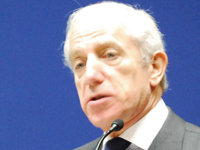Registration
You will receive an email confirming your registration.
IMGXYZ1273IMGZYXChemical weapons were used more frequently than any other weapon of mass destruction in the 20th century. In just twelve years of existence, however, the Chemical Weapons Convention (CWC) has succeeded in destroying 43% of the world’s chemical weapons.
The Carnegie Endowment and Global Green USA hosted Ambassador Rogelio Pfirter, Director-General of the Organization for the Prohibition of Chemical Weapons (OPCW), to discuss how the progress achieved under the CWC should inform approaches to dealing with other WMD threats. Paul Walker, director of Global Green’s Security and Sustainability Program, moderated the discussion, and Carnegie’s Sharon Squassoni introduced the event.
OPCW Progress and Lessons Learned
The CWC has the fastest rate of accession for any arms treaty in history – 188 member states joined since the treaty was first opened for signature in 1993, with over 98% of the world’s population and chemical industry covered under the Convention. Ambassador Pfirter ascribed this success to unique qualities of the CWC:
- Banning entire weapon systems – the development, production, stockpiling, and use of chemical weapons.
- Assignment of equal rights and obligations to all member states.
- Active engagement of industry as a stakeholder in the Convention, which creates an efficient and credible verification regime.
These qualities, in Ambassador Pfirter’s view, allow the CWC to deliver on its four core responsibilities: disarmament, nonproliferation, assistance and protection, and promotion of the peaceful uses of chemistry.
Ambassador Pfirter noted that challenges remain, however:
- Half of all states party to the CWC have not fully implemented their national obligations under the treaty. The two largest holders of chemical weapons – Russia and the United States – still must destroy 70% and 40% of their remaining stockpiles respectively by 2012.
- Additional political support is needed for industry inspections because of controversy over their intensity in some states.
- Seven UN-recognized states remain outside the Convention: Angola, Egypt, Israel, Myanmar, North Korea, Somalia, and Syria. Ambassador Pfirter called on member states to persuade these governments to move towards accession.
- As the threat of terrorism increases, the OPCW must increase the number of commercial facilities inspected. To perform such a massive undertaking, member states will need to provide the OPCW Secretariat with information – facility declarations – beyond what is required. Such cooperation and transparency could allow the OPCW to focus inspections and guard more confidently against proliferation.
Questions & Answers
Participants inquired about future challenges to the Convention. Specifically, audience members questioned whether the CWC export control list needed refining. The OPCW does not deem it necessary to alter the export control list at the moment; however, a team of scientists (Scientific Advisory Board) evaluates the list on an ongoing basis, thus allowing the OPCW to respond to future threats swiftly.
Audience members also speculated on the consequences of Russia and the United States missing their legally-binding 2012 stockpile destruction deadline. Ambassador Pfirter cautioned participants not to presume that Russia and the United States will miss the deadline. He commended the two countries for taking aggressive steps to destroy their stockpiles. If such a situation does occur though, Ambassador Pfirter emphasized the need for all member states party to the CWC to assess honestly the commitments of Russia and the United States.
